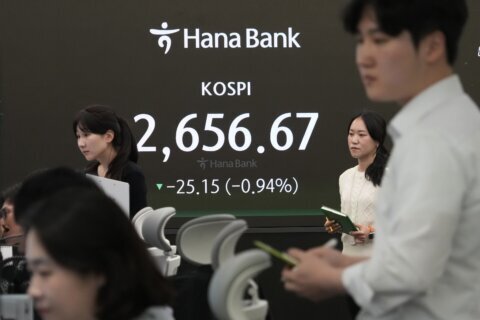SEOUL, South Korea (AP) — New coronavirus infections in South Korea exceeded 7,000 for the third consecutive day on Friday, as the worst surge since the start of the pandemic overwhelmed hospitals and depleted health care workforce.
Critics have blamed the spread on complacency by the government, which dramatically lowered social distancing rules at the start of November in what officials described as the first step toward restoring pre-pandemic normalcy.
Even as cases began to soar in recent weeks, officials were initially hesitant to tighten social distancing, citing exhaustion and frustration by the public with restrictions and their impact on livelihoods. But as the contagious delta variant reduced the effectiveness of vaccines and most people in their 60s or older are still waiting for their booster shoots, and the first cases of omicron were discovered, the sense of urgency became apparent.
Prime Minister Kim Boo-kyum, the No. 2 behind President Moon Jae-in, said during a virus meeting that the country could be forced to take further “extraordinary” measures if it fails to slow the spread of the virus soon.
Officials issued administrative orders requiring hospitals around the country to designate 2,000 more beds combined for COVID-19 treatment.
The increased capacity will be used to ease the crush on hospitals in Seoul and the nearby metropolitan region, where around 90% of intensive care units are already occupied. Officials said more than 1,200 virus patients in the greater capital area who required hospitalization were being forced to wait at home as of Friday morning because of bed shortages.
Officials have revamped their medical response policy so that most mild cases can be treated at home. While around 20,500 are receiving home care, some doctors’ groups say the new approach puts lives at risk.
Kim said the government will also speed up the administration of booster shots by shortening the interval between the second and third vaccine injections from the current four or five months to three months starting next week.
“If it becomes clear that we aren’t succeeding in reversing this crisis situation within the next few days, the government will have no other choice but to employ extraordinary anti-virus measures, including strong social distancing,” he said.
South Korea has reported a daily average of more than 5,800 infections while adding more than 41,000 cases in the past seven days alone, pushing the national caseload to 503,000. The country’s death toll stood at 4,130 after 53 virus patients died in the past 24 hours.
In allowing larger social gatherings, longer indoor dining hours at restaurants and fully reopening schools in November, officials predicted that the country’s improving vaccination rates will help suppress hospitalizations and fatalities even if the virus continues to spread.
However, serious cases and deaths have soared among people in their 60s or older, including those whose immunities have waned after being inoculated early in the vaccine rollout that began in February.
Around 41.5 million people, or 81% of the population of over 51 million, have been fully vaccinated, but only 10% have received booster shots.
The new rules enforced this week ban private gatherings of seven or more people in the greater capital area and require adults to verify their vaccination status at restaurants and other indoor venues. But Kim said such measures haven’t yet showed an effect in slowing transmissions.
Deputy Health Minister Lee Ki-il said officials may further reduce the limit on social gatherings and restore business-hour restrictions at restaurants and bars that were lifted in November if things continue to look bad next week.
“We will try our best to avoid a lockdown,” Lee said.
Some experts have called for stronger measures, such as forcing employers to use remote work and increasing government spending to support small business owners in the devastated service industry to ensure compliance with social distancing rules.
South Korea has also tightened its borders to fend off the new omicron variant since identifying its first cases last week that were linked to arrivals from Nigeria. The KDCA said health workers confirmed three more omicron infections on Friday, bringing the tally to 63.
Scientists say it’s not yet clear whether omicron is more contagious or dangerous than previous strains of the virus.
Copyright © 2024 The Associated Press. All rights reserved. This material may not be published, broadcast, written or redistributed.






